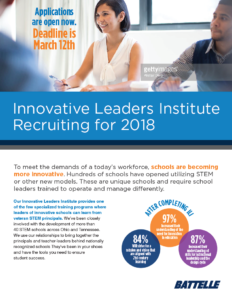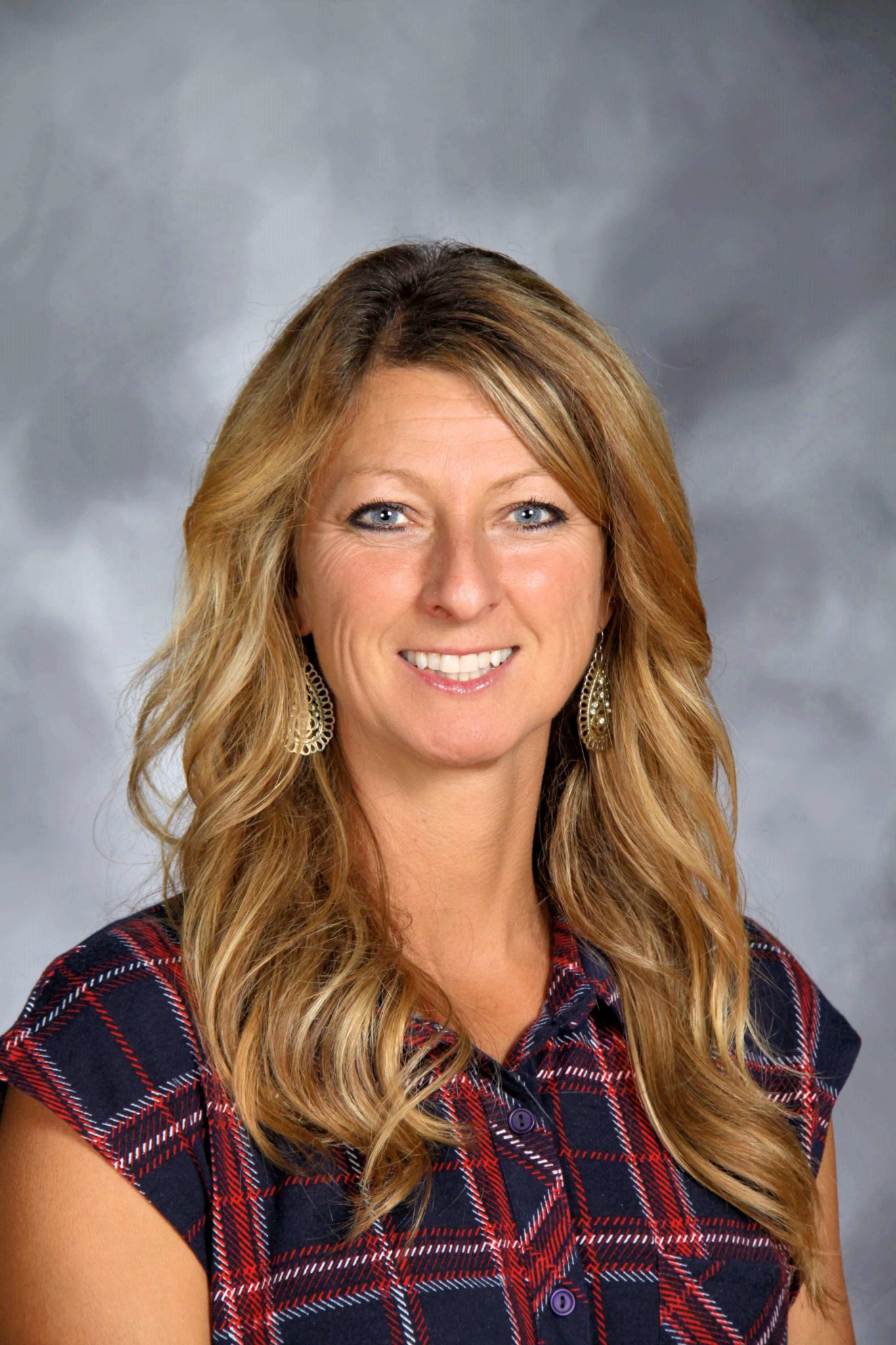The Innovative Leaders Institute (ILI) is now accepting applications for a new cohort of Ohio educators. The ILI is one of the few specialized training programs where leaders of innovative schools can learn from veteran STEM principals.
The application is posted at www.battelle.org/ili2018.
To detail the program, we’re re-posting our 2016 interview with ILI faculty member Dee Martindale, principal at Hebron Elementary School in Hebron, Ohio. Dee was also the founding principal of the award-winning Summit Road STEM Elementary School in Reynoldsburg, Ohio.
Q: Could you tell us a bit about your background in teaching and how you became interested in STEM education?
 A: I was a middle school teacher who really became interested in science once I saw how engaged students could be. I participated in lots of professional development focused around inquiry-based learning and content integration to help students apply the skills they were learning in meaningful ways.
A: I was a middle school teacher who really became interested in science once I saw how engaged students could be. I participated in lots of professional development focused around inquiry-based learning and content integration to help students apply the skills they were learning in meaningful ways.
I then had the opportunity to work for several years providing professional development to teachers when Ohio’s new science academic content standards rolled out. I became interested in STEM education when my district at that time — Reynoldsburg City Schools — received one of the first STEM grants from the state of Ohio. Based on my background in science, content integration and inquiry-based pedagogy, my assistant superintendent asked if I would help create a STEM pathway/program for our district. I began researching everything I could on STEM education and visited STEM schools across the country to figure out what STEM could do for the students of Reynoldsburg City Schools.

Q: Have you been a participant (not a presenter) in the Innovative Leaders Institute or a similar program?
A: I have not been a participant in the ILI program. The ILI program began during my last year as principal at Summit Road. I read about it and was going to get a team together to participate, but then I took a job closer to my home. The principal who took my place at Summit Road did participate in the program. At my new school, I put together a group of teachers who are participating in the current ILI cohort.
When initially planning the STEM school in Reynoldsburg, the ILI would have been an invaluable opportunity to learn alongside other professionals who were interested in transforming learning through STEM education. The ILI program helps to connect teachers and administrators so that we can leverage our strengths, share successes and challenges and work together to make a difference in our schools. Too often we aren’t sure where to start or how to begin leading the change effort, and the ILI program gives you the tools and strategies to do so, as well as planning time with support.
Q: What is your role in the ILI, and what do you hope to impart to participants?
A: I am one of the faculty for the ILI program, with a focus on elementary STEM education. I hope to share my knowledge and experiences with participants to help them make an impact in their schools. I have seen firsthand what a difference STEM education can make in the lives of young people in terms of critical thinking, creativity, collaboration and communication, and I hope to be a resource for ILI participants to use at any time to help them bring STEM culture and pedagogy to their students.
Q: As the founding principal of Summit Road STEM Elementary, what challenges did you face in establishing the school? Do STEM administrators and teachers face unique hurdles?
A: For me, the biggest, yet most exciting, challenge was creating a program that wasn’t prescriptive. There isn’t a “silver bullet” STEM package or curriculum you can order. There isn’t a manual. All STEM schools have common characteristics, yet they are unique-based on the needs of their students and communities. STEM is just good teaching and learning in a way that engages students and affords them the opportunity to showcase their learning to authentic audiences.
There aren’t many hurdles unique to STEM education. Some arguments or questions you may hear: “Doesn’t this take too much time?” “What about high-stakes test preparation?” “Aren’t elementary students too young for this problem-based approach?”
Time is always an issue, but STEM isn’t one more thing, it becomes THE thing, the vehicle that helps you deliver content in a seamless, meaningful way. As for standardized testing, it requires much deeper thinking, more analyzing and applying skills and content. STEM helps to develop these essential thinking skills and creates deeper learning of content. Summit STEM is one of the highest performing elementary schools and just received the National Blue Ribbon Award from the U.S. Department of Education — proof that ALL students are learning.
Q: What would you advise teachers and administrators who might be considering applying for the Innovative Leaders Institute?
A: I would advise anyone interested in growing in the profession to get a team together and join ILI. The professional development you’ll receive will go well beyond the length of the program. You will make connections across the state and be part of something inspiring. You and your team will get the pieces you need to transform the culture and learning environment for your school.
